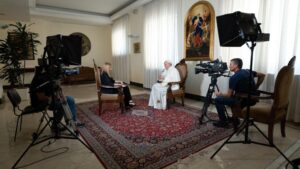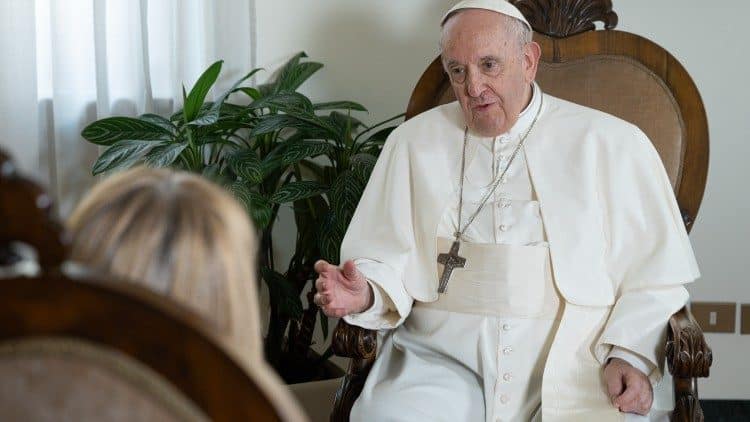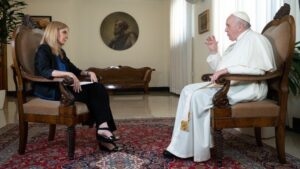“Exploitation is one of the origins of war. The other origin is the geopolitical origin of the domination of territory,” Pope Francis said in an interview with the Télam news agency. In which he addressed other topics such as the crisis and false messiahs, work, artificial intelligence, the synod and hope.
“I like the word crisis because it has internal movement”. But you get out of a crisis upwards, you don’t get out of it by rinsing. You get out of it upwards, and you don’t get out of it alone. Those who want to get out alone turn the way out into a labyrinth, which always goes round and round,” the Pope said.
He also stressed the importance of teaching young people “how to resolve crises. Because that gives maturity”, and they can warn against messianism: “No one can promise to resolve conflicts, if it is not through crises by going upwards. And not alone.
The crisis of humanity
Télam journalist Bernarda Llorente asked the Pope: What is humanity lacking and what is it lacking? Francis responded to the need to promote “true values”:
“Humanity lacks protagonists of humanity, who make its human protagonism visible. Sometimes I notice that this ability to manage crises and to bring out one’s own culture is lacking. Let’s not be afraid of bringing out the true values of a country. Crises are like voices that show us where to proceed”.
He went on to warn that “single thinking banishes human wealth. And human wealth has to contemplate three realities, three languages: of the head, of the heart and of the hands. So that one thinks what one feels and does, feels what one thinks and does, and does what one thinks and feels. That is human harmony. If one lacks any one of these three languages, there is such an imbalance that it leads to single feeling, single pragmatism or single thinking. These are betrayals of humanity.
The dignity of work
On the theme of work, the Pontiff recalled the dignity of work and the grave sin of exploitation: “It is work that anoints you with dignity. Now, the greatest betrayal of this path of dignity is exploitation. Not of the land so that it produces more, but the exploitation of the worker. Exploiting people is one of the gravest sins. And to exploit them for one’s own profit”.
He also stressed the need for workers’ rights, so that they do not become slaves: “When a worker has no rights or is hired for a short time to change them and not pay contributions, he becomes a slave and one becomes an executioner,” he said.
Francis lamented that some people call him a dictator when they hear about his social encyclicals: “It’s not like that. The Pope takes the Gospel and says what the Gospel says. Already in the Old Testament, Hebrew law called for the widow, the orphan and the stranger to be cared for. If a society complies with these three things, it is doing well.
“And I make it clear that I am not a communist, as some say. The Pope follows the Gospel,” Francis reiterated.
The lordship of the individual over technology
He was also asked about the advances in technology and their implications: “The guideline for cultural progress, including artificial Intelligence, is the ability of men and women to manage, assimilate and control it. In other words, men and women are lords of creation, and we must not give up on that. The lordship of the individual over everything. Serious scientific change is progress. You have to be open to that,” the Pope responded.

Taking up the issue of war, he called for universal security through dialogue: “One cannot speak of social security if there is no universal security or one that is in the process of becoming universal”. I believe that dialogue cannot only be nationalistic, it is universal, especially today, with all the facilities there are for communication. That is why I speak of universal dialogue, universal harmony, and universal encounter. And of course, the only enemy of this is war”.
Pope Francis considers that “exploitation” and “the domination of territories” are at the root of wars “fomented by dictatorships”.
In order to build peace and the common good, the Holy Father urges “an awareness of one’s own identity. One cannot dialogue with another if one is not aware of one’s own identity. When two conscious identities meet, they can dialogue and take steps towards agreement, towards progress, towards walking together”.
The Church in harmony
On the development of the Synod, and asked in this interview, what kind of Church is needed for these times? The Pontiff recalled: “From the beginning of the Second Vatican Council, John XXIII had a very clear perception: the Church had to change. Paul VI agreed and continued, as did the Popes who succeeded them. It is not just about changing fashion, it is about a change of growth and in favour of the dignity of people. And there is the theological progression, of moral theology and all the ecclesiastical sciences, including the interpretation of the scriptures, which have been progressing according to the Church’s sentiments. Always in harmony.
Hope, a daily seasoning
The interview continues with personal topics such as the relationship with God:” the Lord is a good friend, he treats me well “; and on the ability to laugh:” a sense of humour humanises “. And the importance of the virtue of hope:
“We cannot live without hope. If we cut off the little hopes of every day, we would lose our identity. We don’t realise that we live on hope. And theological hope is very humble, but it is the one that spices up the daily seasoning”.
On his apostolic journeys, he mentioned that he would like to go to Argentina. “Speaking of further afield, I still have Papua New Guinea,” he said.











